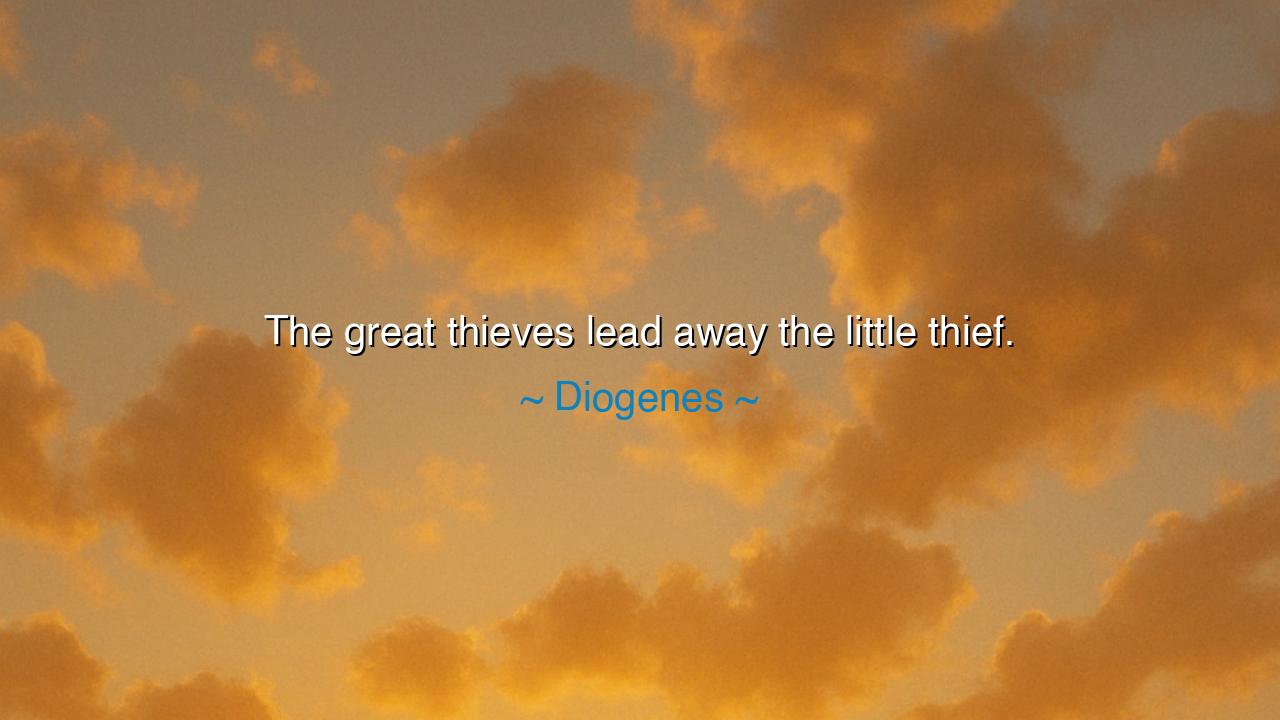
The great thieves lead away the little thief.






Hear, O seekers of truth and justice, the piercing words of Diogenes of Sinope, who declared: “The great thieves lead away the little thief.” Though brief as a spark, these words burn with the fire of centuries, exposing the hypocrisy of power and the corruption of men who hide behind law while violating its spirit. In this single line, the philosopher unmasks the eternal order of deceit: that the mighty often escape judgment while the small are punished for the same crimes, and that the world, blinded by titles and appearances, bows before its greatest deceivers.
Diogenes, that fierce and fearless cynic of ancient Greece, was a man who despised false virtue. He lived not in marble halls but in a barrel, and he carried a lantern through the streets of Athens, saying he searched for an honest man but could find none. His words sprang from a time when Athens claimed to be the cradle of reason and democracy, yet was already infected by greed and pride. His quote, “The great thieves lead away the little thief,” is not merely satire—it is revelation. It proclaims that corruption grows in proportion to power, and that those who steal the most often wear crowns, robes, or fine suits rather than shackles.
Consider the tale of the Roman Empire, whose rulers once called themselves divine and just. While the common thief who stole a loaf of bread was crucified, the emperors plundered nations and called it conquest. Julius Caesar himself crossed the Rubicon, seizing Rome from its own people, yet history crowned him “great.” So it has been throughout the ages: the petty criminal is punished, but the grand thief is glorified. Diogenes saw this injustice and scorned it, laughing at the blindness of humanity, which bows before those who enslave it and scorns those who mirror its own sins.
In our own age, the pattern remains unchanged. The corporate magnate who steals millions through deceitful schemes is celebrated as “shrewd,” while the hungry man who takes food to survive is condemned. Governments wage wars in the name of justice, seizing resources and crushing the weak, yet cloak their greed in the robes of righteousness. The philosopher’s words echo across time, whispering the same truth: power justifies its theft through authority, and the people, deceived by grandeur, often admire their captors.
But Diogenes did not speak merely to accuse—he spoke to awaken. His teaching calls each soul to examine its own complicity, to see how we, too, allow the “great thieves” to thrive by our silence and submission. The world’s corruption endures not because evil is strong, but because conscience is asleep. To expose hypocrisy, we must first strip it of its disguises—titles, wealth, and status—and judge all deeds by the same standard. The little thief steals bread; the great thief steals nations. Yet both are men, and both must be measured not by power, but by principle.
In his life, Diogenes became the embodiment of fearless truth. He confronted kings, mocked the vain, and lived without need. When Alexander the Great visited him and asked, “What can I do for you?” Diogenes replied, “Stand out of my sunlight.” He reminded the conqueror that even emperors cannot own what is free—the light, the mind, the soul. Thus he proved that true freedom lies not in possessions, but in detachment from corruption and illusion.
The lesson, then, is this: beware the grandeur of thieves, for the worst crimes are committed in the name of virtue. Do not be dazzled by crowns or titles, nor quick to condemn the small offender while admiring the powerful one. Live, instead, as Diogenes lived—clear-eyed, courageous, and incorruptible. Speak truth to power, and do not let your conscience be bought. For if enough honest men refused to bow before the great thieves, the world itself would awaken from its long sleep and the balance of justice would be restored.
Thus, the words of Diogenes live on—not as a relic of cynicism, but as a mirror held before every age. They remind us that empires crumble, tyrants fade, and wealth decays—but truth endures, burning through hypocrisy like sunlight through mist. And those who dare to live by it, though mocked by the world, remain eternally free.






AAdministratorAdministrator
Welcome, honored guests. Please leave a comment, we will respond soon